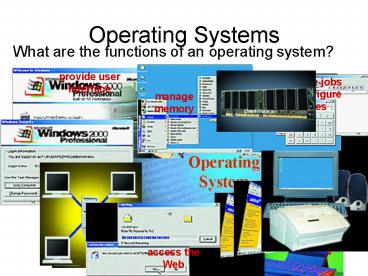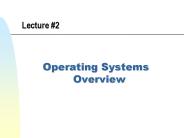Operating Systems - PowerPoint PPT Presentation
1 / 19
Title:
Operating Systems
Description:
Embedded Operating Systems. What is Pocket PC OS ... Allows document creation. Embedded Operating Systems. What is Palm OS? Used in handheld computers ... – PowerPoint PPT presentation
Number of Views:33
Avg rating:3.0/5.0
Title: Operating Systems
1
Operating Systems
- What are the functions of an operating system?
2
Operating System Functions
- How does a personal computer boot up?
3
Operating System Functions
Step 3 The BIOS performs the POST, which checks
components such as the mouse, keyboard
connectors, and expansion cards.
expansion cards
4
Operating System Functions
Step 4 The results of the POST are compared with
data in the CMOS chip.
CD-ROM drive
CMOS
Step 4
processor
BIOS
expansion cards
5
Operating System Functions
Step 5 The BIOS looks for the system files in
drive A (floppy disk drive) and then drive C
(hard disk).
floppy disk drive
CD-ROM drive
CMOS
processor
hard disk
Step 5
BIOS
expansion cards
6
Operating System Functions
Step 6 The boot program loads the kernel of the
operating system into RAM from storage (hard
disk). The operating system in memory takes
control of the computer.
floppy disk drive
CD-ROM drive
CMOS
processor
hard disk
(RAM) memory modules
BIOS
Step 6
expansion cards
7
Operating System Functions
Step 7 The operating system loads configuration
information and displays the desktop on the
screen. The operating system executes programs in
the StartUp folder.
8
Operating System Functions
- What is a user interface?
- Controls how you enter data and instructions and
how information displays on the screen
9
Operating System Functions
- What are features of a graphical user interface?
- Menu a set of commands from which you can choose
- Icon a small image that represents a program, an
instruction, a file, or some other object - Web pages can be delivered or pushed
automatically to your screen
10
Operating System Functions
- What is multitasking?
- Allows a single user to work on two or more
applications that reside in memory at the same
time
- The foreground contains the active application
the one you currently are using - The other programs that are running, but are not
in use, are in the background
11
Operating System Functions
- What is formatting?
- The process of preparing a disk for reading and
writing - Most floppy and hard disk manufacturers preformat
their disks - Various operating systems format disks differently
12
Operating System Functions
- What is a network operating system?
- An operating system that supports a network
- Also called a network OS or NOS
- A network is a collection of computers and
devices connected together via communications
media and devices
client
client
client
laser printer
server controls access
13
Operating System Functions
- What are features of a network operating system?
- The server is the computer that controls access
to the network and provides a centralized storage
area - The other computers on the network are called
clients
14
Types of Operating Systems
- What are three categories of operating systems?
15
Network Operating Systems
- What is UNIX?
- A multitasking operating system developed in the
early 1970s by scientists at Bell Laboratories - Lacks interoperability across multiple platforms
- Several versions exist, each slightly different
- Command-line interface
16
Network Operating Systems
- What is Linux?
- A popular, free, multitasking UNIX-type operating
system
- Also includes many programming languages
- Open-source software
- Code is available to the public
- Some versions are command-line and others are GUI
17
Product on the Cutting Edge
- Operating system created by Linus Torvalds
- A free program offered as alternative to
Microsoft Windows and Apple Mac OS - Linux GNU General Public License allows anyone
to obtain and modify the source code and then
redistribute the revised product - A large, friendly community of users distribute
the operating system and provide an extensive
number of user groups, mailing lists,
newsletters, and forums
18
Embedded Operating Systems
- What is Pocket PC OS?
- A scaled-down operating system developed by
Microsoft - Works on a specific type of handheld computer,
called a Pocket PC - Allows access to all the basic PIM functions
- Provides Web access
- Supports handwriting recognition
- Allows document creation
19
Embedded Operating Systems
- What is Palm OS?
- Used in handheld computers
- Palm from Palm, Inc.
- Visor from Handspring
- Manages data and synchronizes this information
with a desktop computer - Some access the Internet































